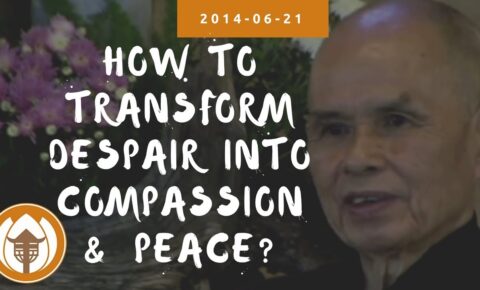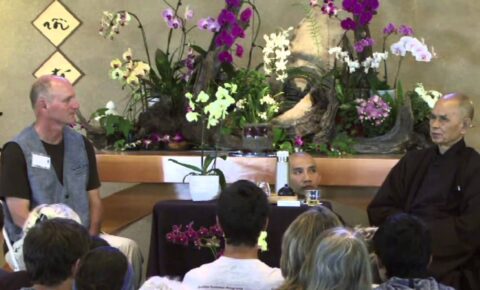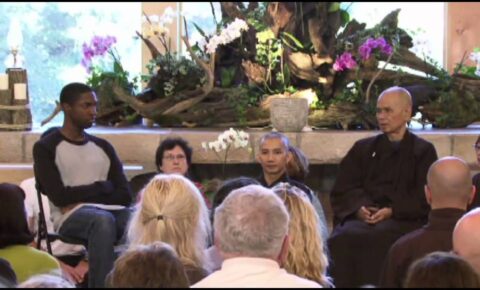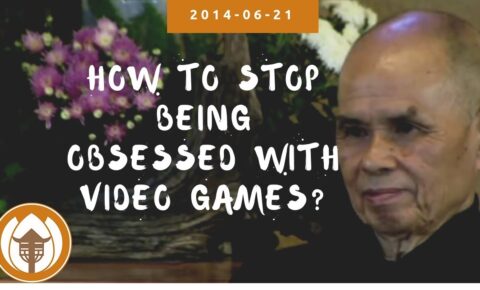October 12, 2013. 100-minute dharma talk given by Thich Nhat Hanh from Deer Park Monastery in Escondido, California during the 2013 Nourishing Great Togetherness teaching tour. This is the first dharma talk for the 6-day retreat with the theme Finding Our True Home. We begin with two chants from the monastics.
This morning we heard the Sutra on Knowing a Better Way to Live Alone. What does this mean? Is this a practice of solitude? To live alone means not to have a second person in you. Maybe an object of desire or craving. To live alone is to be completely satisfied with the here and now. There is no need to run anymore. This is the practice of aimlessness.
I have arrived. Enlightenment. Happiness. Joy. They are all right here and right now. Walking meditation. What prevents us from arriving? Recognizing habit energy and why is this important. We all have habit energy that push is to do or say something. We can name it and not have to push it away using our mindfulness. We can create a new habit of mindfulness.
Mindfulness is always mindfulness of something – the object of our mindfulness. As we are mindful, concentration is born. Where there is mindfulness there is the beginning of concentration. And with these two energies, we can have insight.
We touch our true home in every moment. Touching the present moment. We can use walking meditation to learn more about touching the present moment.
The Buddha taught about four kinds of food (Nutriments) and that nothing can survive without food. Edible food is the first. We eat I’m a way to retain compassion in our heart. We can practice mindful eating to reduce the suffering in the world. The second kind is sense impressions. It’s what we “eat” with our eyes, ears, nose, and mind. We have to careful what we consume in ourselves and in our society. The third is volition – the will to act. Our deepest kind of desire and can give us a lot of energy. More of an ultimate concern for our life, something meaningful. What is our volition? This can be a good nutriment or a negative nutriment. This is a topic Thay will offer to Google and other corporate leaders next week.
Mindful Breathing. The first exercise of mindful breathing is awareness of our breathing, and the second is following our breathing. This brings concentration. The third is being aware of my body and the fourth we calm our body. With the fifth and sixth we get to the domain of feelings – joy and happiness. What are the conditions of happiness. The seventh is recognizing our suffering and the eighth is calming our suffering.
http://www.youtube.com/watch?v=fqXoAvZFcFo&feature=share

How to stop looking for other people’s approval?
Thay answers questions on 21 June 2014. Question 5 Help us caption & translate this video! http://amara.org/v/FzGe/ Topics: buddhism, mindfulness, thich nhat hanh, teenager, teens, inferiority, affirmation, approval, criticism, self-confidence, independent, belief, vietnam war







